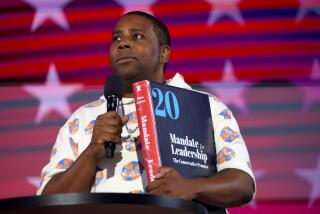Kerry Skips Nuance on Mideast Policy When It’s Needed Most
Terse isn’t the first word usually applied to Sen. John F. Kerry’s disquisitions on foreign policy. At a town meeting just before January’s New Hampshire primary, Kerry wandered through nearly five minutes of agonized ambivalence when a fellow Vietnam veteran asked him why he supported the war in Iraq.
President Bush once told a visiting senator that he didn’t “do nuance.” By all indications, Kerry, the son of a former diplomat, believes nuance is the heart of diplomacy. He resists the categorical and the uninflected. Rarely does he answer a foreign policy question without qualifications that hedge his position -- but also maintain his flexibility to negotiate as president without overtly violating campaign promises. He prizes the subtle distinctions and useful ambiguities that allow great powers to move beyond differences they cannot resolve.
But Kerry was a model of unambiguous concision the other day when he was asked about Bush’s meeting this month with Israeli Prime Minister Ariel Sharon.
At the meeting, Bush blessed Sharon’s plan to unilaterally withdraw Israeli troops and settlers from the Gaza Strip and parts of the West Bank. Then Bush declared in a letter to Sharon that “in light of new realities on the ground,” it is “unrealistic to expect” that Israel would ever return to a future Palestinian state all of the occupied land on the West Bank. Likewise, Bush declared that “it seems clear” Palestinian refugees displaced from Israel would have a “right of return” to a new Palestinian state rather than Israel itself.
Bush’s assurances to Sharon ignited a firestorm of protest across Europe and the Arab world. “I fear increased violence,” said Egyptian President Hosni Mubarak. French President Jacques Chirac called the Bush-Sharon maneuver “dangerous” and a “troubling precedent.” Diplomats everywhere said they felt blindsided.
In short, Bush’s meeting with Sharon seemed precisely the sort of unilateral, headstrong gesture that Kerry has in mind when he accuses Bush of pursuing the most arrogant and ideological foreign policy in U.S. history.
So jaws dropped across Washington when Kerry responded with just one word after host Tim Russert asked him on “Meet the Press” whether he supported Bush’s promises to Sharon.
“Yes,” Kerry said.
“Completely?” Russert followed.
“Yes,” Kerry said again.
Not much ambiguity there. Kerry probably hasn’t answered an important question in so few words since his wedding day.
Kerry’s uncharacteristically unequivocal response to Bush and Sharon offer two insights into the senator’s thinking. One ought to reassure Kerry’s friends and critics alike. The second raises more difficult questions.
The reassuring lesson is that Kerry isn’t captive to international opinion. Kerry constantly accuses Bush of isolating America by ignoring the views of others. But Kerry’s response to the Bush-Sharon initiative signaled that he doesn’t value world opinion so much that he won’t confront it when he considers it misplaced.
“Because you believe in building partnerships and sharing risks, that doesn’t mean you’re always going to agree with the rest of the world,” insists one top Kerry foreign policy advisor.
Indeed, the eruptions over the Bush-Sharon arrangement seem overwrought in one important sense: Substantively, Bush didn’t promise Sharon anything that President Clinton didn’t offer in his marathon efforts to negotiate an Israeli-Palestinian peace.
Clinton’s proposals also would have let Israel keep part of the West Bank and provided Palestinians the right to return to a new state, not Israel itself. The international uproar obscured the continuity between Clinton and Bush. Kerry’s endorsement of the arrangement showed that, even amid all the sound and fury, he grasped that central point.
But Clinton offered Israel these concessions in a negotiation that also provided important benefits to the Palestinians, such as land swaps inside Israel’s borders. The most telling criticism of Bush’s maneuver -- from critics abroad and in the United States -- is that he reached these understandings with Sharon without including the Palestinians in the discussions. Bush did note that the issues could only be resolved permanently through direct talks between Israelis and Palestinians. But on critical questions, he seemed to prejudge the results of those negotiations. That threatens America’s credibility as a broker between the two sides.
The troubling aspect of Kerry’s response was that he failed to recognize -- or at least acknowledge -- that critical point. Perhaps Kerry feared a backlash from Jewish donors and voters if he complained about freezing out the Palestinians. Perhaps he saw no advantage in opening any daylight with the president over Israel.
But Kerry routinely insists that in America’s dealings with the world, how and why matter as much as what and when. Every day he tells audiences that Bush weakens America’s standing abroad by listening too little. How much credibility does Kerry have to make that case when he suggests he is just as willing to act without consultation if he considered it worthwhile, or politically expedient?
Many questions remain about Sharon’s plan. Almost all praise the planned withdrawal from Gaza, but skeptics fear he’s positioning himself to demand far more of the West Bank than Clinton offered, or a viable Palestinian state could surrender. With Sharon, it’s usually prudent to assume he will pursue the most confrontational course available.
An overriding lesson of the Sharon years is that any lasting progress toward peace will require an American president as willing to constrain the Israelis as pressure the Palestinians. It has never been clear Bush accepts that mission. For all Kerry’s promises of a more cooperative and nuanced foreign policy, it is not clear after the last few days that the senator does either.
*
Ronald Brownstein’s column appears every Monday. See current and past Brownstein columns at www.latimes.com/brownstein.
More to Read
Get the L.A. Times Politics newsletter
Deeply reported insights into legislation, politics and policy from Sacramento, Washington and beyond. In your inbox three times per week.
You may occasionally receive promotional content from the Los Angeles Times.










